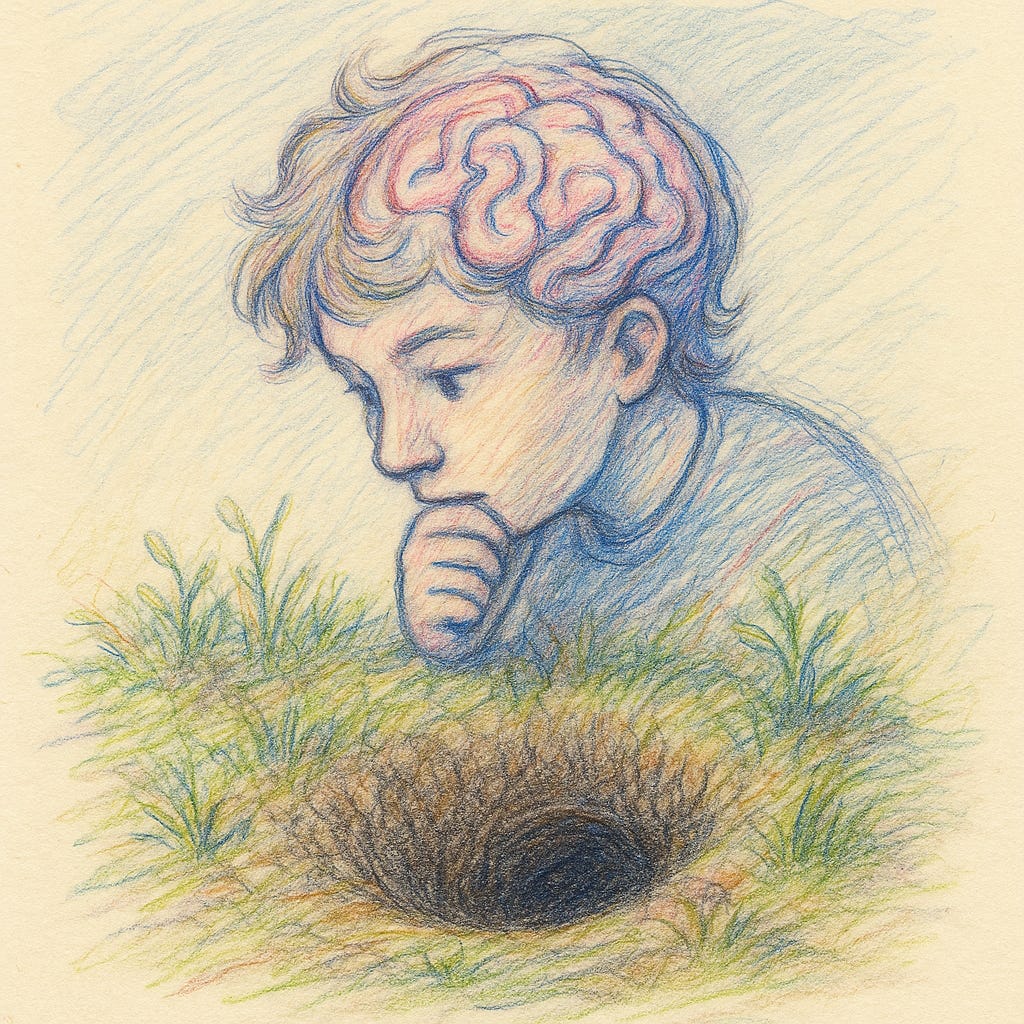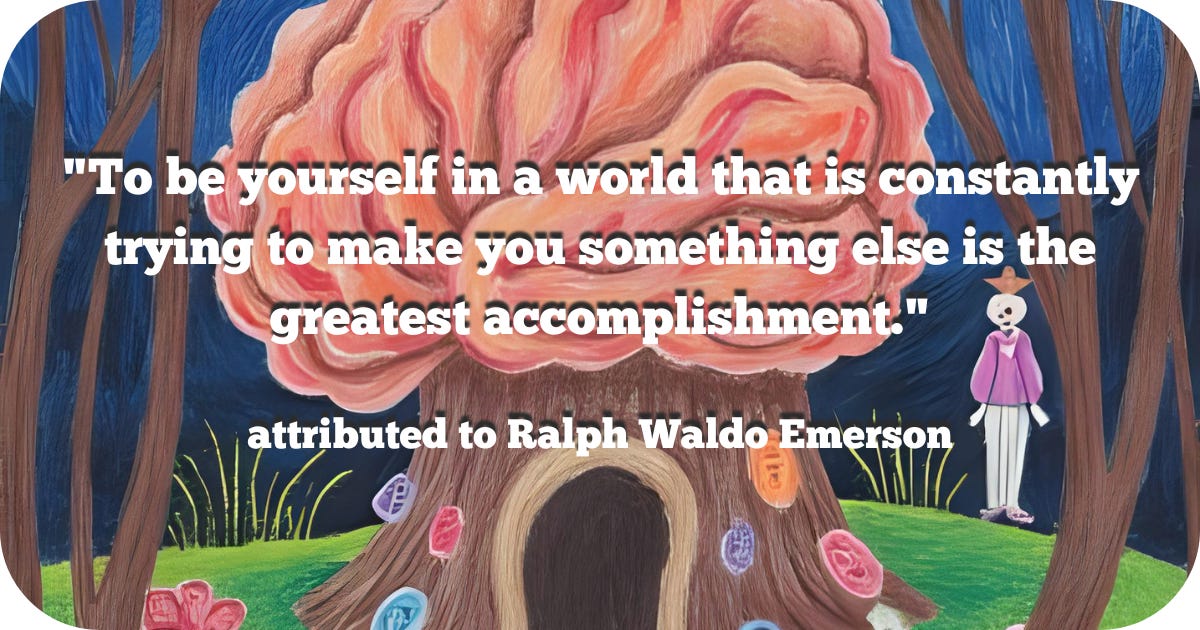Part 1: Rabbit Holes & Neurodiversity
Or Why “Flux” Might Be a Feature, Not a Flaw
A year or so ago, while researching how to write a novel, I came across a blog post with this paraphrased quote from Dallas Smith:
“Sometimes the right way to do something is just the way that it gets done.”
I liked that. A reflective truth—simple, and oddly profound.
But what pulled me down the first rabbit hole of the day was this fuller sentence:
“I heard some advice once that basically said that sometimes the right way to do something is just the way that it gets done, and for a neurodivergent person like me, that’s absolutely true.”
(My bolding. That last bit is what caught me.)
Down the Hole I Went
Yep. Down the neurodivergent rabbit hole I went—and here’s what I came away with.
Technically, aren’t we all neurodivergent in some way?
After all, ‘neurodiversity’ is the idea that each of us experiences and interacts with the world in different ways.
I’ve been on board with that idea for decades.
I didn’t know, until this recent wander, that neurodiversity is considered “primarily a social justice movement” promoting acceptance of everyone, regardless of how their brains work.
Why we need a new term just to encourage acceptance is beyond me. Shouldn’t we already be doing that?
The term “neurodivergent” has become most associated with autism spectrum disorder (ASD) and attention deficit hyperactivity disorder (ADHD)—which, speaking of, sent me down another rabbit hole.
(More on that in the prequel to this series: “Purr Like a Lion, Write Like a Writer.”)
And don’t make the mistake of thinking neurodivergence applies only to ASD or ADHD.
Remember the first bullet? And the second? 😊
Where to Learn More
For a more grounded overview of neurodivergence, the following article offers a helpful breakdown:
What Does It Mean to Be Neurodivergent?
It covers:
What neurodivergence is, according to experts
What conditions may fall under that umbrella
How to know if you’re neurodivergent
Treatments (if any)
And how to support neurodivergent individuals
IMHO (In My Honest Opinion)
Because we humans seem to love extremes, we often flatten concepts like this into a binary spectrum—neurodivergent on one end, neurotypical on the other.
Sure, those poles can be helpful reference points. But that’s not where most of us live.
We live in the messy, marvelous middle—where the real nuance is.
Unfortunately, those in-between experiences often get overlooked. The extremes get the attention; the subtleties get lost.
(Then again, I have a doctorate in psychology, so maybe I’m biased toward nuance.)
A Personal Detour
I was diagnosed with ADHD decades ago. But even as a kid—long before any official label—I knew my brain worked differently.
So much so that it’s still a running joke that I’m from another planet entirely. (If that’s true, I hope the mother ship arrives soon.)
Here’s the thing: I believe psychologists mean well. But when we label something a disorder—as in “autism spectrum disorder” or “attention deficit hyperactivity disorder”—we plant the idea that something is wrong.
Who wants to be “disordered”? That word carries too much weight. It lingers.
Maybe that’s the problem. Maybe we’ve overused words like “normal” or “abnormal” until they’ve lost their contextual meaning and gained unhelpful baggage.
I understand that labels can help us identify and belong—but they can also stigmatize and stall.
Full disclosure: I’m not a fan of labels.
Let’s Flux Instead
Here’s a thought:
What if these so-called “disorders” aren’t disorders at all?
What if they’re just different wiring—a kind of evolutionary upgrade in progress?
What if they’re simply patterns of thinking and behaving that we don’t yet fully understand?
Maybe I don’t have attention deficit hyperactivity disorder.
Maybe I have attention deficit hyperactivity flux.
I like the sound of that much better.
There is nothing wrong with being different.
[Period.]
So what, pray tell, does any of this have to do with writing?
Well… that’s exactly what we’ll explore in Part 2: Neurodivergent Writers: The Craft of Divergence.
Until then, I’ll leave you with a question or two:
What rabbit holes do you fall into?
And have they ever led you somewhere wonderful?
Tell me—I’d love to hear.







When our middle daughter was about 6 months old we attended a weekend conference for parents of children with Down syndrome.
Emily Perl Kingsley was the keynote speaker. She was a writer for Sesame Street in it's early days and she had a son with Down syndrome who was a young actor on the show.
She made the comment, "Labels are for jars, not children."
That stuck with me. I do not like labels either. More often they are used to exclude rather than to include.
I have gotten the impression that a lot of people self-diagnose as something like neurodivergent (and/or other things) as a way to excuse themselves from social norms, etc. Not all, but certainly some. And then there's the fact that our media consumption can change things. Of course one feels like they have ADHD if they consume dopamine-driven shortform media for hours a day. Again, I know ADHD is a real baseline condition for many, but it can also become just a habit of mind, as Nicholas Carr pointed out in The Shallows 15 years ago.